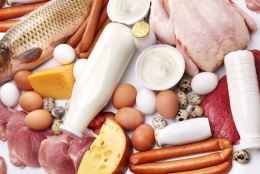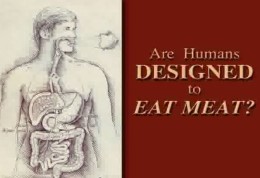What is Cholesterol? Cholesterol is an organic chemical substance which is manufactured by our body's cells, but predominantly made in our liver. It is an essential component of cell membranes throughout the body, particularly the brain, central nervous system and myelin sheath which insulates the nerves. Cholesterol is also needed to make bile acids necessary for digestion. Additionally, it aids in the formation of male and female sex hormones, and vitamin D.
The Daily Required Intake of Cholesterol is Zero
Although cholesterol is a vital component in our diet to work properly, our bodies produce sufficient amounts of cholesterol to meet our daily needs without having to consume any from our diets. We do not need to consume cholesterol in order to make cholesterol. The Physicians Committee for Responsible Medicine notes that the amount of cholesterol that needs to be acquired from our diets is zero. If we examine the Dietary Reference Intakes (developed and published by the Institutes of Medicine published on the USDA website) there is no recommended daily dietary requirement for cholesterol. Dr. Michael Greger's video Trans Fat, Saturated Fat, and Cholesterol: Tolerable Upper Intake of Zero does an excellent job in explaining this in more detail.
Our Bodies Make all the Cholesterol we Need
 It's important to realize that producing sufficient cholesterol can be accomplished by consuming any type of food, even plant-based foods. An excerpt from The Harvard Medical School Guide to Lowering Your Cholesterol "Understanding Cholesterol: The Good, the Bad, and the Necessary" states: "So even if you ate a completely cholesterol-free diet, your body would make the approximately 1,000 mg it needs to function properly. Almost all of the cells of the body can make the cholesterol they need. Educators often don't emphasize the point that all humans make substantial quantities of cholesterol. Your body does need food to fuel the cholesterol production process, but it can be virtually any kind of food, even the cholesterol-free kind. As long as the food contains carbon—which carbohydrates, fats, and proteins all do—it provides the body with the building blocks to make its own cholesterol. Cholesterol is made out of the carbon that is recycled from the food you eat."
It's important to realize that producing sufficient cholesterol can be accomplished by consuming any type of food, even plant-based foods. An excerpt from The Harvard Medical School Guide to Lowering Your Cholesterol "Understanding Cholesterol: The Good, the Bad, and the Necessary" states: "So even if you ate a completely cholesterol-free diet, your body would make the approximately 1,000 mg it needs to function properly. Almost all of the cells of the body can make the cholesterol they need. Educators often don't emphasize the point that all humans make substantial quantities of cholesterol. Your body does need food to fuel the cholesterol production process, but it can be virtually any kind of food, even the cholesterol-free kind. As long as the food contains carbon—which carbohydrates, fats, and proteins all do—it provides the body with the building blocks to make its own cholesterol. Cholesterol is made out of the carbon that is recycled from the food you eat."
This Fact is Acknowledged by Many Prominent Medical Establishments
The Clevland Clinic - "Your body makes some cholesterol on its own, regardless of what you eat. Your body produces more than enough cholesterol on its own to stay healthy. Most Americans eat far too much cholesterol and fat, which can raise blood cholesterol levels. High levels of cholesterol can lead to heart disease."
The National Heart, Lung, and Blood Institute - "Your body needs some cholesterol to make hormones, vitamin D, and substances that help you digest foods. Your body makes all the cholesterol it needs. People who have high blood cholesterol have a greater chance of getting coronary heart disease, also called coronary artery disease."
Kaiser Permanente - "Cholesterol is a type of fat (lipid) in your blood. Your cells need cholesterol, and your body makes all it needs. If you have too much cholesterol, it starts to build up in your arteries. The buildup can also lead to dangerous blood clots and inflammation that can cause heart attacks and strokes." Kaiser Permanente even recommends a whole-food, plant-based diet for their patients and employees.
American Heart Association - "Cholesterol is a waxy substance that comes from two sources: your body and food. Your body, and especially your liver makes all the cholesterol you need and circulates it through the blood. Your liver produces more cholesterol when you eat a diet high in saturated and trans fats."
World Health Organization - "There is no requirement for dietary cholesterol and it is advisable to keep the intake as low as possible."
Health Problems Develop When Cholesterol Levels are High
Equally important, the American Heart Association says that when we eat foods high in saturated and trans fats (such as animal products and processed foods) our liver produces even more cholesterol. Since the body needs only a limited amount of cholesterol, health problems develop when we have extra fat and cholesterol circulating in our bodies. Over the years, "Excess cholesterol can depost in your arteries and promote formation of a deposit known as a plaque, which can grow larger over time; this process is called atherosclerosis. A piece of the plaque may break off and a blood clot may form on the exposed surface of the plaque. These blood clots may block or decrease the blood flow and oxygen supply to your heart, brain, and other body parts. One of the best ways to decrease your risk of having a heart attack or stroke is to control the amount of cholesterol in your blood." (American Heart Association - Circulation Journal)
We can Live Well Without Consuming Cholesterol from Dietary Sources

Contrary to the popular false claims generated by those advocating diets based on high-fat animal products, cholesterol from animal sources is not required to support optimal health since our bodies make all the cholesterol that it needs.
For additional information, click on our following Pinterest Boards:
(2) Prevent and Reverse Disease Using a Plant-Based Diet
(3) Animal-Based Diets Promote Illness
(4) Heart Disease